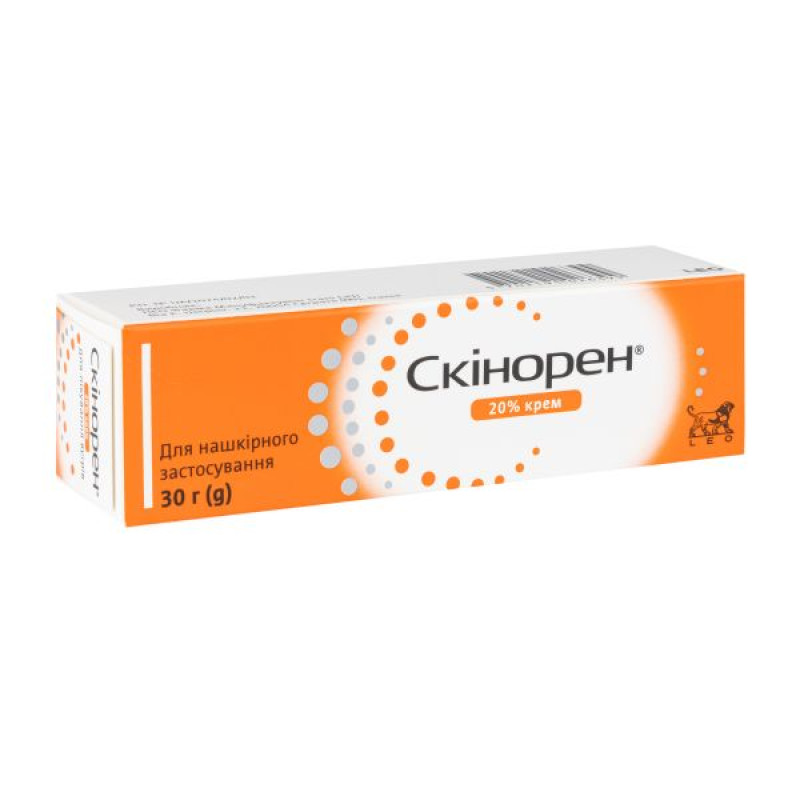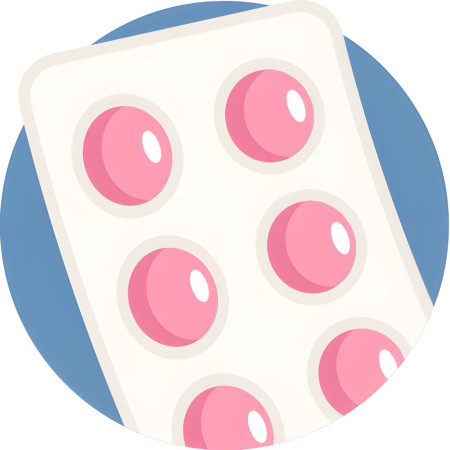Skinoren cream 20% tube 30 g

Instructions Skinoren cream 20% tube 30 g
Composition
active ingredient: micronized azelaic acid;
1 g of cream contains 0.2 g of micronized azelaic acid;
excipients: benzoic acid (E 210), stearyl macrogolglycerides, PCL Liquid® (mixture of excipients: cetearyl octanoate and isopropyl myristate), glycerol monostearate 40-55, cetostearyl alcohol, propylene glycol, glycerol 85%, purified water.
Dosage form
Cream.
Main physicochemical properties: white opaque cream.
Pharmacotherapeutic group
Topical remedies for acne treatment.
ATX code D10A X03.
Pharmacological properties
Pharmacodynamics
Azelaic acid, the active ingredient in Skinoren® cream, is a straight-chain dicarboxylic acid that, being present in nature, is free from toxicity, teratogenicity, and mutagenicity.
The therapeutic efficacy of Skinoren® cream in the treatment of acne is believed to be due to its antimicrobial action and direct effect on follicular hyperkeratosis. Clinically, a significant decrease in the density of Propionibacterium acnes colonization and a significant decrease in the fraction of free fatty acids in skin surface lipids are observed.
Azelaic acid inhibits keratinocyte proliferation in vitro and in vivo and normalizes the processes of terminal differentiation of the epidermis, which are disturbed in acne. In the rabbit ear model, azelaic acid accelerates comedolysis of tetradecane-induced comedones.
At a concentration of 0.31−2.5%, after prolonged contact for 30−120 minutes, a biocidal effect is manifested against gram-positive and gram-negative aerobic bacteria, anaerobic bacteria and fungi.
In vitro studies have not demonstrated the presence of mutant forms resistant to azelaic acid in either Staphylococcus epidermidis or Propionibacterium acnes.
Pharmacokinetics.
After application of the cream, azelaic acid penetrates all layers of human skin. Penetration occurs more rapidly through damaged skin than through intact skin. After a single application of azelaic acid (in the form of 5 g of Skinoren® cream) to the skin surface, 3.6% of the applied dose is absorbed subcutaneously.
The metabolism of azelaic acid has been studied after oral administration in doses up to 5 g.
Part of the azelaic acid adsorbed through the skin is excreted unchanged in the urine. The rest is broken down by β-oxidation to dicarboxylic acids with shorter chain lengths (C7, C5), which have also been detected in the urine.
Systemic tolerability studies after repeated oral and topical administration of azelaic acid have not revealed any indication that even under extreme conditions, such as application to a large area and/or under occlusive dressings, side effects can be expected.
Indication
Treatment of acne (acne vulgaris), characterized by the presence of comedones, papules, pustules and small nodules.
Contraindication
Hypersensitivity to the active substance or to any of the excipients of the drug.
Interaction with other medicinal products and other types of interactions
Interaction studies have not been conducted.
Application features
For external use only.
Do not allow Skinoren® cream to get into the eyes, mouth or mucous membranes. If the cream accidentally gets into the eyes, mouth and/or mucous membranes, rinse them immediately with plenty of water. If eye irritation persists, it is recommended to consult a doctor. Wash your hands after each application of Skinoren® cream.
Concomitant use of cosmetic products, alcoholic or aggressive skin cleansers, tinctures, astringents or abrasives, or exfoliants should be limited during treatment as much as possible.
Benzoic acid causes moderate irritation to the skin, eyes and mucous membranes. Propylene glycol may also cause skin irritation.
In rare cases, exacerbation of bronchial asthma has been reported during post-marketing surveillance in patients receiving azelaic acid (see section "Adverse reactions").
Use during pregnancy or breastfeeding
Pregnancy
There are no adequate and well-controlled studies of topical azelaic acid preparations in pregnant women.
Animal studies suggest possible effects on pregnancy, embryonal/fetal development, parturition or postnatal development. However, no adverse effects were observed in animal studies at doses 3-32 times the maximum recommended human dose based on body surface area.
Skinoren® cream should be prescribed with caution to pregnant women.
It is not known whether azelaic acid is secreted into human breast milk in vivo. However, an in vitro experiment using the equilibrium dialysis method has shown that the active substance may enter breast milk. The distribution of azelaic acid in breast milk is unlikely to lead to significant changes in relation to its baseline level already present in milk, since it does not concentrate in breast milk and less than 4% of topically applied azelaic acid is absorbed systemically, without increasing the endogenous exposure of the substance above physiological levels. However, Skinoren® cream should be used with caution in breastfeeding women.
Contact of the infant with the skin/breast treated with the medicine should be avoided.
Fertility
There are no data available on the effects of Skinoren® cream on human fertility. Animal studies have shown no effect on the fertility of male or female rats.
Ability to influence reaction speed when driving vehicles or other mechanisms
Azelaic acid has no effect on the reaction rate when driving or working with other mechanisms.
Method of administration and doses
For cutaneous use.
Apply Skinoren® cream 2 times a day (morning and evening) to the affected areas of the skin and rub in gently with massaging movements. Approximately 2.5 cm of cream is enough for the entire face. Before applying Skinoren® cream, the skin should be thoroughly washed with water and dried. You can also use a mild cosmetic product to cleanse the skin.
It is important to use Skinoren® cream regularly throughout the entire course of treatment.
The duration of the course of treatment may vary depending on the individual course of the disease and is determined by the degree of its severity.
To achieve optimal results, it is recommended to use Skinoren® continuously for several months. There is clinical experience with continuous use of the drug for a period of up to 1 year. In patients with acne, noticeable improvement is usually observed after about 4 weeks.
In case of excessive skin irritation (see section "Adverse reactions"), the amount of cream to be applied or the frequency of application of Skinoren® cream should be reduced to 1 time per day until the irritation disappears. If necessary, therapy can be temporarily interrupted for a few days. After a short period of treatment without noticeable results, a repeated medical evaluation is necessary.
Elderly patients.
Special studies of the use of the drug in patients over 65 years of age have not been conducted.
Patients with liver dysfunction.
Special studies of the use of the drug in patients with impaired liver function have not been conducted.
Patients with renal impairment.
No specific studies have been conducted on the use of the drug in patients with renal impairment.
Children.
The drug can be used in adolescents aged 12 years and older. There is no need for dose adjustment when prescribing Skinoren® cream to adolescents aged 12 years and older. The safety and efficacy of Skinoren® cream in children under 12 years of age have not been established.
Overdose
Due to the very low local and systemic toxicity of azelaic acid, intoxication with this substance is unlikely.
Side effects
In clinical studies and during post-marketing surveillance, the most frequently reported adverse reactions included burning, itching, and erythema at the application site.
Adverse reactions observed during clinical trials are listed in the table by frequency of occurrence according to the MedDRA classification:
very common (≥1/10);
common (≥1/100 to <1/10);
uncommon (≥1/1000 to <1/100);
rare (from ³1/10000 to <1/1000);
very rare (<1/10,000), frequency unknown (cannot be estimated from the available data).
| Organ system/class | Very often | Often | Infrequently | Rare |
| Skin and subcutaneous tissue disorders | Seborrhea, acne, skin depigmentation | Cheilitis (inflammation of the lips), urticaria1, rash1 | ||
| General disorders and administration site conditions | Burning sensation, itching and erythema at the site of application | Peeling, pain, dryness, skin discoloration, and irritation at the application site | Paresthesia, dermatitis, discomfort and swelling at the application site | Blisters, eczema, a feeling of warmth, and ulceration at the application site |
| Immune system disorders | Hypersensitivity (including angioedema1, contact dermatitis1, eye oedema1, face oedema1) and exacerbation of bronchial asthma (see section "Special warnings and precautions for use") |
1These additional adverse reactions were identified during post-marketing use of Skinoren® cream.
Usually, local skin irritations resolve during the course of treatment.
Children
In clinical studies involving children and adolescents aged 12 to 18 years (454/1336; 34%), local tolerability was similar to that in adult patients.
Expiration date
3 years.
After first opening, the shelf life is 6 months.
Storage conditions
Store at a temperature not exceeding 30 ºС in a place inaccessible to children.
Packaging
30 g in a tube, 1 tube in a cardboard box.
Vacation category
Without a prescription.
Producer
LEO Pharma Manufacturing Italy SRL.
Location of the manufacturer and address of its place of business
Via E. Schering, 21, 20054 Segrate (MI), Italy.
There are no reviews for this product.
There are no reviews for this product, be the first to leave your review.
No questions about this product, be the first and ask your question.

















